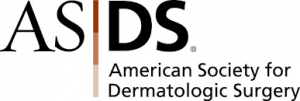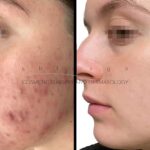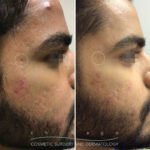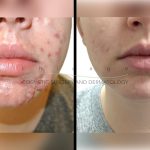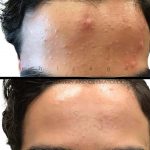Acne
What is acne?
The term acne is used to describe a condition which may include comedones (blackheads and whiteheads), red pimples, and even large nodules. The condition affects mainly the face, but may appear on the shoulders, back, chest, arms, and buttocks. The tendency towards acne often, but not always, runs in families.
What causes acne?
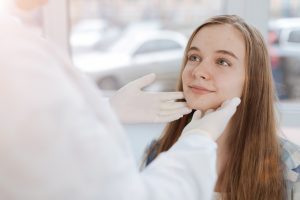 The cause starts with the sebaceous (oil) glands that connect to hair follicles. These glands of the skin secrete and oily material called sebum, which normally softens and lubricates the skin. The sebaceous glands become most active at puberty, leading to somewhat oily skin. The oil is excreted into the hair follicles which creates plugging of the hair follicles with dead skin cells. When there is no inflammation, this leads to closed comedones (whiteheads) or open comedones (blackheads). The black color is not due to dirt, but rather from chemical changes in the cells. Finally, a bacterium called Propionibacterium acnes thrives off of the sebum, overgrows, and attracts your body’s immune cells, leading to inflammation and red bumps or nodules.
The cause starts with the sebaceous (oil) glands that connect to hair follicles. These glands of the skin secrete and oily material called sebum, which normally softens and lubricates the skin. The sebaceous glands become most active at puberty, leading to somewhat oily skin. The oil is excreted into the hair follicles which creates plugging of the hair follicles with dead skin cells. When there is no inflammation, this leads to closed comedones (whiteheads) or open comedones (blackheads). The black color is not due to dirt, but rather from chemical changes in the cells. Finally, a bacterium called Propionibacterium acnes thrives off of the sebum, overgrows, and attracts your body’s immune cells, leading to inflammation and red bumps or nodules.
Will my acne go away?
In most patients, acne tends to subside late in the teens to early twenties. Some patients continue to experience acne throughout adulthood. It is impossible to predict when acne will disappear. While the condition is active, it may alternately erupt and then improve.
What things make acne worse?
Severe or prolonged stress may aggravate acne. That’s why acne may flare up before examinations, weddings, during new jobs, etc. In women, acne may flare shortly before menstruation because of the influence of hormonal factors. Foods that are high in sugars, like chocolate, milk and soda pop may aggravate acne. Avoiding these and other high sugar foods will improve their complexions. In general, the best diet for those with acne is a low refined sugar diet with lots of fruits and vegetables. Omega 3’s (fish oil or algae pills) can be beneficial as well (take 2000 mg/day).
How about cosmetics?
Cosmetics containing oil should be avoided as this can lead to plugging of the skin’s pores. It is best to avoid heavy greases or gels in the hair especially if you have acne around the hairline. Look for cosmetics that are “oil free”, “water-based”, “non-comedogenic.” Colorescience Pressed Powder Foundation SPF 20 or Primer SPF 20 provide chemical free matte coverage.
What should I avoid?
Rubbing and scrubbing of the face will eventually aggravate acne. Cleansing two to three times a day is adequate, but washing vigorously may cause more inflammation. Squeezing of acne lesions should also be avoided as it may lead to more irritation, inflammation and prolongation of redness.
How do I control my acne?
There are number of different medications which can help control acne, from mild to severe forms. Remember, all medications for acne may take 2-3 months to help, as your skin takes 30 days to cycle.
Below are some product tips and treatments to consider for acne prone skin. Please visit our skin care store in the acne section for purchases: Chicago Skin Science
Glycolic Acids (Alpha Hydroxy Acids) and Salicylic Acids (Beta Hydroxy Acids) – Contained in washes, toners, lotions and peels, these acids help to unplug pores and regulate the skin cycling process. They even help to fade the red spots that occur after acne breakouts.
Benzoyl Peroxides (Purify BPO Wash, Purify Daily Acne Gel) – Benzoyl peroxide creams and washes help to kill off the bacteria which cause acne. The bacteria cannot become resistant to it. Be careful though, benzoyl peroxide can bleach your clothing, towels and sheets!
Retinoids/Vitamin A (PCA Intensive Clarifying Retinol 0.5%, CCSD Reverse Tretinoin, 0.25% or 0.5%) – Used nightly, Retinoids work by opening up plugged pores and decrease inflammation and pink or dark spots. They make the skin cells less sticky, so patients may notice mild flaking of the skin when first used. They will take several months to help unplug pores, as the skin takes one month to cycle.
EltaClear SPF46 – sunscreen with an anti-inflammatory ingredients to reduce acne and redness.
Various treatments are offered by our esthetics department, below are some of our favorites for acne prone patients!
SilkPeel Clarity MD Microdermabrasion with salicylic acid and Bakuchiol (a natural antibiotic) helps clear comedonal and inflammatory acne faster.
Deep Pore Cleansing- combines microdermabrasion with extractions.
Acne Extraction Treatment- a light steam, detox gel, plus extractions.
PCA Masks Clarifying 20% Sal Acid or Pumpkin (Sal Acid plus Pumpkin enzymes)
PCA Peels -customized to treat acne and spots and cause mild exfoliation in 3-5 days.
CCSD Restart Peels creates moderate peeling with 8 peeling agents and retinol.
Blue Light Therapy kills off the acne causing germ and reduces breakouts.
Tria clarifying system allows twice daily treatment with blue light at home to keep the skin clear.
Clarisonic cleansing brush is great for cleansing of the pores and will help remove impurities and makeup

